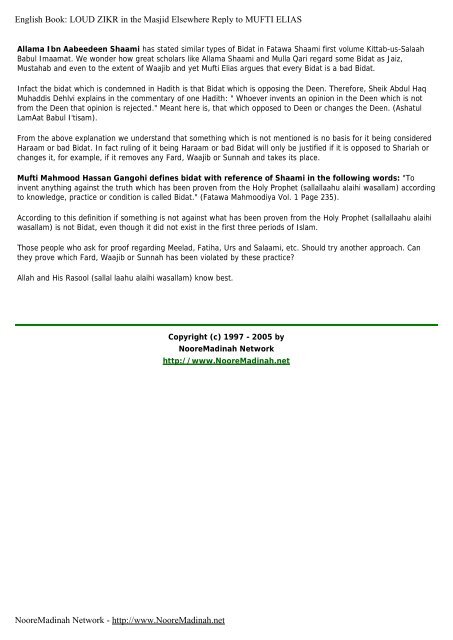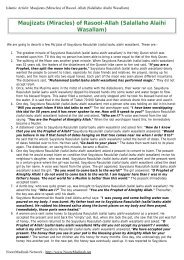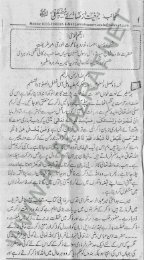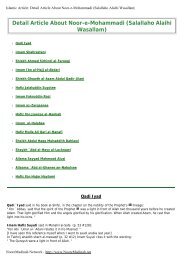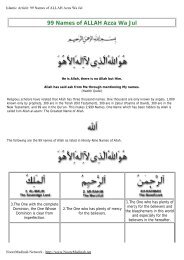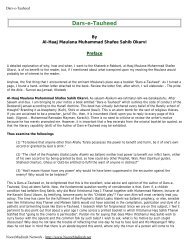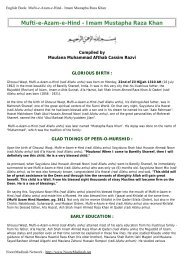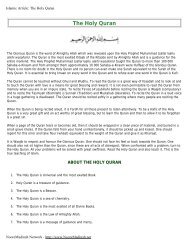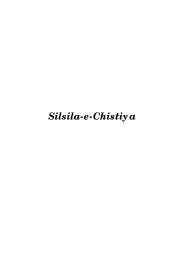LOUD ZIKR in the Masjid & Elsewhere & Reply to MUFTI ELIAS
LOUD ZIKR in the Masjid & Elsewhere & Reply to MUFTI ELIAS
LOUD ZIKR in the Masjid & Elsewhere & Reply to MUFTI ELIAS
You also want an ePaper? Increase the reach of your titles
YUMPU automatically turns print PDFs into web optimized ePapers that Google loves.
English Book: <strong>LOUD</strong> <strong>ZIKR</strong> <strong>in</strong> <strong>the</strong> <strong>Masjid</strong> <strong>Elsewhere</strong> <strong>Reply</strong> <strong>to</strong> <strong>MUFTI</strong> <strong>ELIAS</strong><br />
Allama Ibn Aabeedeen Shaami has stated similar types of Bidat <strong>in</strong> Fatawa Shaami first volume Kittab-us-Salaah<br />
Babul Imaamat. We wonder how great scholars like Allama Shaami and Mulla Qari regard some Bidat as Jaiz,<br />
Mustahab and even <strong>to</strong> <strong>the</strong> extent of Waajib and yet Mufti Elias argues that every Bidat is a bad Bidat.<br />
Infact <strong>the</strong> bidat which is condemned <strong>in</strong> Hadith is that Bidat which is oppos<strong>in</strong>g <strong>the</strong> Deen. Therefore, Sheik Abdul Haq<br />
Muhaddis Dehlvi expla<strong>in</strong>s <strong>in</strong> <strong>the</strong> commentary of one Hadith: " Whoever <strong>in</strong>vents an op<strong>in</strong>ion <strong>in</strong> <strong>the</strong> Deen which is not<br />
from <strong>the</strong> Deen that op<strong>in</strong>ion is rejected." Meant here is, that which opposed <strong>to</strong> Deen or changes <strong>the</strong> Deen. (Ashatul<br />
LamAat Babul I'tisam).<br />
From <strong>the</strong> above explanation we understand that someth<strong>in</strong>g which is not mentioned is no basis for it be<strong>in</strong>g considered<br />
Haraam or bad Bidat. In fact rul<strong>in</strong>g of it be<strong>in</strong>g Haraam or bad Bidat will only be justified if it is opposed <strong>to</strong> Shariah or<br />
changes it, for example, if it removes any Fard, Waajib or Sunnah and takes its place.<br />
Mufti Mahmood Hassan Gangohi def<strong>in</strong>es bidat with reference of Shaami <strong>in</strong> <strong>the</strong> follow<strong>in</strong>g words: "To<br />
<strong>in</strong>vent anyth<strong>in</strong>g aga<strong>in</strong>st <strong>the</strong> truth which has been proven from <strong>the</strong> Holy Prophet (sallallaahu alaihi wasallam) accord<strong>in</strong>g<br />
<strong>to</strong> knowledge, practice or condition is called Bidat." (Fatawa Mahmoodiya Vol. 1 Page 235).<br />
Accord<strong>in</strong>g <strong>to</strong> this def<strong>in</strong>ition if someth<strong>in</strong>g is not aga<strong>in</strong>st what has been proven from <strong>the</strong> Holy Prophet (sallallaahu alaihi<br />
wasallam) is not Bidat, even though it did not exist <strong>in</strong> <strong>the</strong> first three periods of Islam.<br />
Those people who ask for proof regard<strong>in</strong>g Meelad, Fatiha, Urs and Salaami, etc. Should try ano<strong>the</strong>r approach. Can<br />
<strong>the</strong>y prove which Fard, Waajib or Sunnah has been violated by <strong>the</strong>se practice?<br />
Allah and His Rasool (sallal laahu alaihi wasallam) know best.<br />
NooreMad<strong>in</strong>ah Network - http://www.NooreMad<strong>in</strong>ah.net<br />
Copyright (c) 1997 - 2005 by<br />
NooreMad<strong>in</strong>ah Network<br />
http://www.NooreMad<strong>in</strong>ah.net


